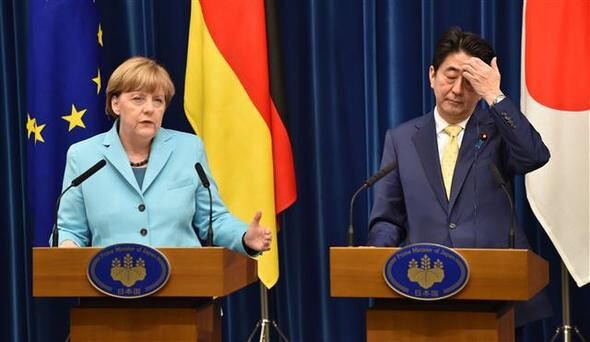hankyoreh
Links to other country sites 다른 나라 사이트 링크
Angela Merkel calls on Japan to resolve historical issues

German Chancellor Angela Merkel referenced her country’s efforts to reflect on its historical actions during a speech on Mar. 9 at Hamarikyu Asahi Hall in offices of the Asahi Shimbun newspaper. Merkel’s visit to Japan, her first in seven years, was a diplomatic event that drew attention not only in Japan, but in its East Asian neighbors South Korea and China. The contrast is stark: Germany, another country convicted of war crimes in World War II that achieved historical reconciliation with other European nations, and Japan, which has yet to resolve its “historical conflicts” with its neighbors in the more than seven decades since the war’s end.
Merkel began her speech with a reference to the 2011 earthquake that rocked eastern Japan, a disaster that marks its fourth anniversary on Mar. 11.
“I greatly admire the spirit of community with which the Japanese people set out to rebuild,” she said of the catastrophe’s aftermath.
Merkel went on to suggest that Tokyo should make a greater contribution to sustaining a world order recently unsettled by situations such as upheavals in Ukraine, saying about Germany and Japan, “They are now in a position to exercise global responsibility within the world order.”
She also sent a delicately worded but direct message to Japan on historical issues. When asked after the speech how East Asian countries can improve relations and reconcile, Merkel said it was “difficult for me as a German Chancellor to give you advice,” but added that Germany able to reconcile with other European countries because it “faced its past squarely.” The news agency Reuters interpreted her remarks on Mar. 9 as a “polite reminder” to Japanese Prime Minister Shinzo Abe.
Merkel went on to suggest that Seoul and Beijing should be more accepting of Japan’s efforts, noting that “generous gestures of [Germany’s] neighbors” such as France helped reconciliation to succeed.
“There is a need to make peaceful efforts, and all possible action should be taken,” she added.
Another clear message from Merkel was a call to move away from nuclear power.
“For many years, I was in a position of supporting the peaceful use of nuclear energy,” Merkel said.
“When the accident occurred in Japan, which has an outstanding technological level, I came to realize that there were risks [to nuclear power] no one could have foreseen,” she continued.
The remarks suggest that the Fukushima disaster in 2011 was one of the direct precipitating factors behind Germany‘s decision to abandon its reliance on nuclear power as of 2022. Merkel also released a video before her visit stating, “What we can say about the Fukushima experience is that safety comes first. I believe we must travel this road together with Japan.”
In another possible sign of her interest in the issue, Merkel’s first stop after arriving at Tokyo Haneda International Airport around 7 am on Mar. 9 was to the National Museum of Emerging Science and Innovation in Tokyo, where she observed the humanoid robot Asimo developed by Honda. She later showed interest in Japan’s renewable energy industry, touring a naturally curving solar panel display and asking one of the researchers if it was currently in use.
In the afternoon, Merkel met with the emperor and his wife and had a meeting with Abe. She plans to wrap up her two-day schedule on Mar. 10 after meeting with opposition Democratic Party leader Katsuya Okada.
By Gil Yun-hyung, Tokyo correspondent
Please direct questions or comments to [english@hani.co.kr]

Editorial・opinion
![[Editorial] Perilous stakes of Trump’s rhetoric around US troop pullout from Korea [Editorial] Perilous stakes of Trump’s rhetoric around US troop pullout from Korea](https://flexible.img.hani.co.kr/flexible/normal/500/300/imgdb/original/2024/0509/221715238827911.jpg) [Editorial] Perilous stakes of Trump’s rhetoric around US troop pullout from Korea
[Editorial] Perilous stakes of Trump’s rhetoric around US troop pullout from Korea![[Guest essay] Preventing Korean Peninsula from becoming front line of new cold war [Guest essay] Preventing Korean Peninsula from becoming front line of new cold war](https://flexible.img.hani.co.kr/flexible/normal/500/300/imgdb/original/2024/0507/7217150679227807.jpg) [Guest essay] Preventing Korean Peninsula from becoming front line of new cold war
[Guest essay] Preventing Korean Peninsula from becoming front line of new cold war- [Column] The state is back — but is it in business?
- [Column] Life on our Trisolaris
- [Editorial] Penalties for airing allegations against Korea’s first lady endanger free press
- [Editorial] Yoon must halt procurement of SM-3 interceptor missiles
- [Guest essay] Maybe Korea’s rapid population decline is an opportunity, not a crisis
- [Column] Can Yoon steer diplomacy with Russia, China back on track?
- [Column] Season 2 of special prosecutor probe may be coming to Korea soon
- [Column] Park Geun-hye déjà vu in Yoon Suk-yeol
Most viewed articles
- 1Korea likely to shave off 1 trillion won from Indonesia’s KF-21 contribution price tag
- 2Nuclear South Korea? The hidden implication of hints at US troop withdrawal
- 3[Editorial] Perilous stakes of Trump’s rhetoric around US troop pullout from Korea
- 4With Naver’s inside director at Line gone, buyout negotiations appear to be well underway
- 5In Yoon’s Korea, a government ‘of, by and for prosecutors,’ says civic group
- 6[Column] ‘Choson’: Is it time we start referring to N. Korea in its own terms?
- 7‘Free Palestine!’: Anti-war protest wave comes to Korean campuses
- 8How many more children like Hind Rajab must die by Israel’s hand?
- 9Overseeing ‘super-large’ rocket drill, Kim Jong-un calls for bolstered war deterrence
- 10[Photo] ‘End the genocide in Gaza’: Students in Korea join global anti-war protest wave